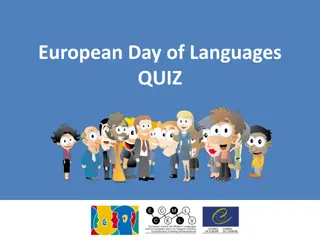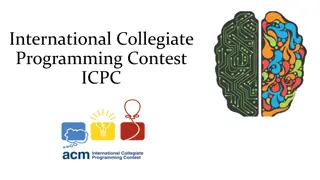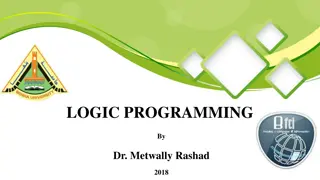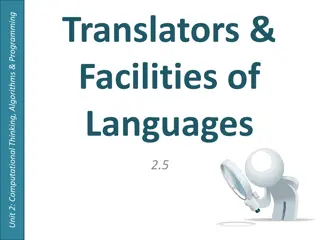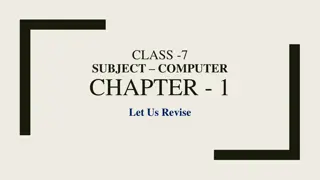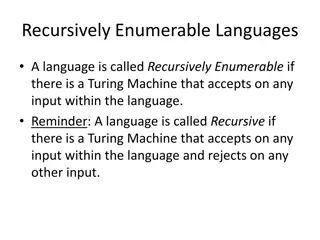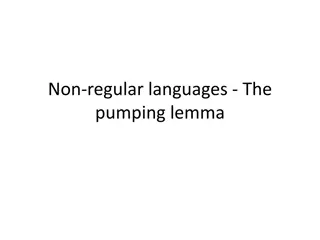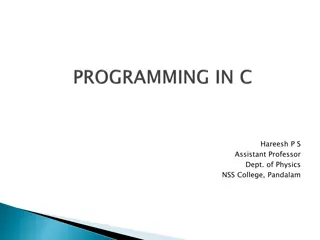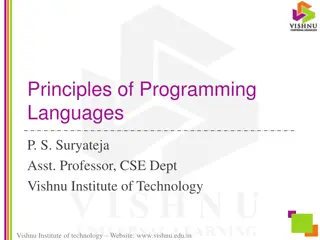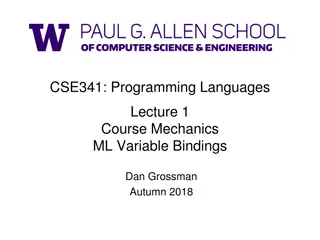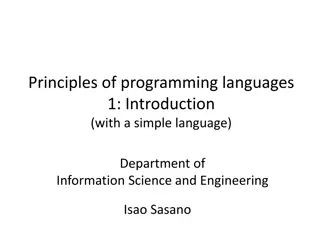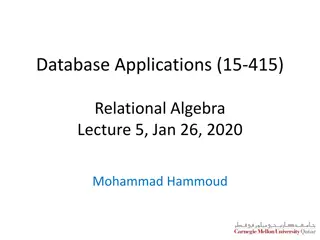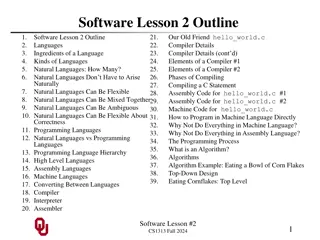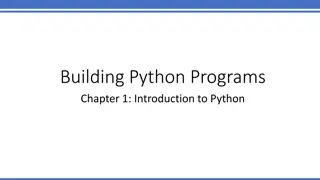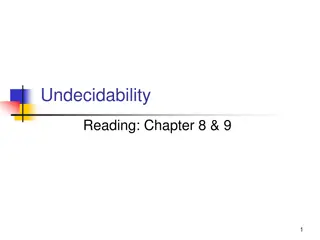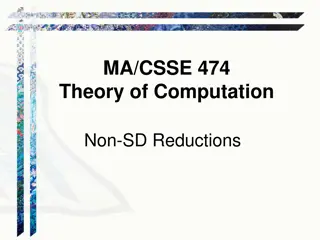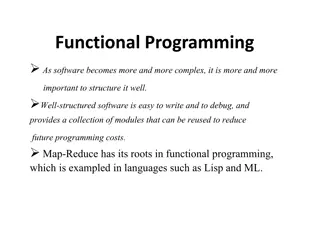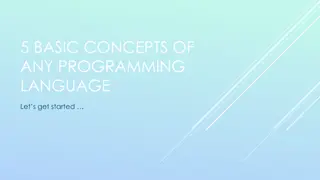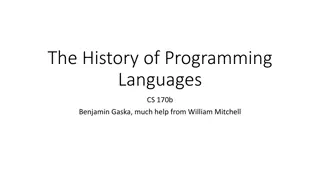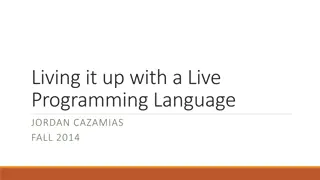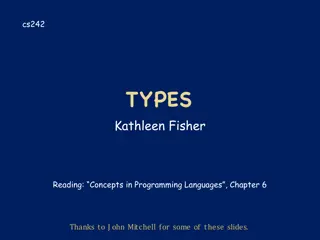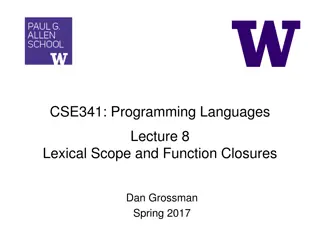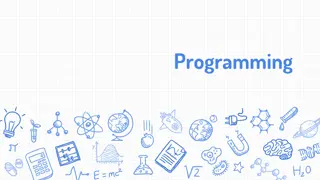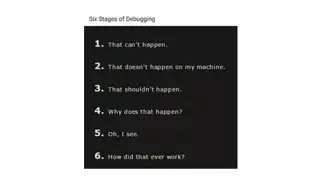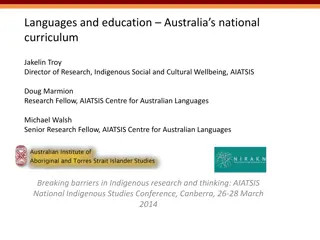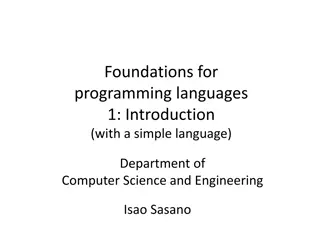European Day of Languages QUIZ
Explore interesting facts about languages in the world through a quiz. Discover the number of living languages, the origins of written language, official languages like Azeri, and the history of sign languages. Test your knowledge on the European Day of Languages!
6 views • 24 slides
International Collegiate Programming Contest (ICPC) Overview and Rules
The International Collegiate Programming Contest (ICPC) is a prestigious global competition in competitive programming supported by major tech companies like Google and Facebook. Participants tackle logical and mathematical problems by developing efficient algorithms and implementing them in various
5 views • 17 slides
Understanding Logic Programming and AI Principles
This course focuses on logic programming principles applied to AI problems. Topics include Prolog programming, backtracking, recursive rule definition, built-in predicates, lists manipulation, and advanced techniques. Declarative languages like Prolog differ from procedural languages by describing p
1 views • 26 slides
Decision Analysis and Operations Research in Management
This content delves into Management Decision Analysis and Operations Research techniques such as Linear Programming, Integer Linear Programming, Dynamic Programming, Nonlinear Programming, and Network Programming. It covers the phases of an Operations Research study, mathematical modeling for decisi
0 views • 36 slides
Understanding Programming Languages and Translators in Computational Thinking
Programming languages are categorized into generations, from low-level machine code to high-level languages. Translators like assemblers, compilers, and interpreters help convert code for computer execution. Each generation has its characteristics and purposes, affecting ease of programming, debuggi
1 views • 18 slides
Module 2: PSEA and Safe Programming Training of Trainers (ToT) by CRS HRD
This Module 2 focuses on PSEA and Safe Programming, covering key sessions on understanding safe programming, identifying protection and SEA risks, and mitigating risks. It emphasizes the importance of safe programming in increasing safety, dignity, and access, with staff playing a crucial role. Part
2 views • 19 slides
Understanding Computer Programming: Basics and Beyond
In this chapter, we delve into the fundamental concepts of computer programming. We explore the definition of a program, the role of programming languages, types of programming languages, and generations of programming languages. Additionally, an assignment is provided to reinforce the key learnings
0 views • 25 slides
Understanding Recursive vs Recursively Enumerable Languages
Comparison between recursive and recursively enumerable languages in terms of Turing Machines acceptance, decidable languages, recognizable languages, and partial predicates. Explains the concepts with examples and how Turing Machines decide membership in languages.
0 views • 8 slides
Understanding Non-Regular Languages and the Pumping Lemma
Dive into the world of regular and non-regular languages, exploring the concept of the pumping lemma. Learn about different types of non-regular languages and why some languages require an infinite number of states to be represented by a finite automaton. Find out why mathematical proofs are essenti
0 views • 62 slides
Overview of Grammar Types and Chomsky Hierarchy
The four types of grammars are General, Context-Sensitive, Context-Free, and Linear grammars, each recognizing a specific set of languages. Chomsky Hierarchy categorizes these grammars into four levels, indicating subsets of languages they can recognize. Context-free grammars have specific productio
0 views • 17 slides
Understanding Formal Semantics of Programming Languages: From Lambda Calculus to Separation Logic
Explore the foundational concepts of formal semantics in programming languages, covering Lambda Calculus, Untyped and Simply-typed languages, Imperative languages, Operational and Hoare logics, as well as Separation logic. Delve into syntax, reduction rules, typing rules, and operational semantics i
7 views • 14 slides
Understanding Programming Languages: Levels and Basics
Programming languages facilitate communication between humans and computers, with machine language being the fundamental binary code understood by computers. Different levels of programming languages exist, from low-level machine language to high-level languages like C. Natural languages are meant f
0 views • 35 slides
Principles of Programming Languages at Vishnu Institute of Technology
Introduction to Principles of Programming Languages course including prerequisites, objectives, outcomes, and syllabus at Vishnu Institute of Technology. The course covers key concepts, popular programming paradigms and languages, practical knowledge in lexical analysis and parsing, as well as writi
0 views • 43 slides
Introduction to Computers and C++ Programming Lecture 1 - Overview and Basics
This lecture covers the fundamental concepts in computer systems and programming using C++. Topics include the main components of a computer, bytes and addresses in memory, computer systems hardware and software, understanding programs, programming languages, compilers, preparing and running C++ pro
1 views • 21 slides
The Currency of Love: Importance of Communication and the 5 Languages of Love
Understanding the essence of love lies in effective communication and expressing love through the five languages - Words, Gifts, Actions, Time, and Physical Touching. Communication is depicted as the currency of love, essential for deepening bonds between partners. Gary Chapman's concept of the 5 La
4 views • 33 slides
Autumn 2018 CSE341 Programming Languages Course Overview
Welcome to the Autumn 2018 CSE341 course on Programming Languages! Join us for a comprehensive 10-week journey to grasp the core concepts that underlie all programming languages. Dive into ML, Racket, and Ruby while honing your programming skills through homework assignments. Engage with the course
1 views • 32 slides
Principles of Programming Languages: Introduction and Machine Language Overview
This material covers the basics of programming languages, including an introduction to a simple language, evaluation methods, and contact information for the instructor. It explains machine language, the native language of computers, and the transition to high-level programming languages. The benefi
0 views • 24 slides
Web Application Development and Programming CTE Program Overview
Viera High School offers a comprehensive CTE program in Web Application Development and Programming, taught by Mr. Dohmen. Students learn popular programming languages like Python, SQL, JavaScript, Java, C#, and C. The courses cover web programming, JavaScripting, and PHP programming, providing cert
1 views • 7 slides
Understanding Relational Query Languages in Database Applications
In this lecture, Mohammad Hammoud discusses the importance of relational query languages (QLs) in manipulating and retrieving data in databases. He covers the strong formal foundation of QLs, their distinction from programming languages, and their effectiveness for accessing large datasets. The sess
0 views • 39 slides
Introduction to Programming and Computer Instructions
Programming is the process of creating instructions for computers to follow and accomplish tasks. It involves turning human language instructions into detailed binary machine language. Before learning programming, individuals may have different levels of experience, ranging from no experience to pro
0 views • 16 slides
Understanding Languages in Software Development
Exploring the fundamentals of languages in software development, this content covers natural languages, programming languages, and the components of a language like symbols, grammar, and semantics. It delves into the differences between natural and programming languages, highlighting the essential r
0 views • 39 slides
Development of Attosecond Theory for Nobel Prize through Verilog Programming
Attosecond generation is a crucial technique for creating attosecond pulses by manipulating radiation waves. This research paper focuses on developing the Attosecond generation equation through Verilog programming and validating it using test programming techniques. The interface between equations,
0 views • 15 slides
Exploring Computer Science and Python Programming Basics
Introduction to Computer Science processes and problem-solving, highlighting the significance of programming languages like Python. Learn about procedural, functional, and object-oriented programming languages, with a focus on the simplicity and widespread usage of Python for beginners. Dive into th
0 views • 45 slides
Comparison of C vs Rust Programming Languages
C and Rust are programming languages known for their efficiency in resource-constrained environments. While C offers direct control over hardware and is favored by advanced programmers for its performance, Rust provides memory safety features that prevent common errors like null pointer dereferences
0 views • 50 slides
Understanding Recursive and Recursively Enumerable Languages
Exploring the concepts of decidability and undecidability in computer science, specifically focusing on Recursive and Recursively Enumerable (RE) languages. Recursive languages always halt, while RE languages may or may not halt, showcasing the differences between decidable and undecidable problems.
0 views • 35 slides
Understanding Non-SD Languages in Theory of Computation
Explore the concept of Non-SD languages in the theory of computation, which are larger in number compared to SD languages. Non-SD languages involve infinite search or analyzing whether a Turing Machine will loop indefinitely. Discover examples and insights into proving languages are not SD through c
0 views • 38 slides
Introduction to Programming Languages and Functional Programming with OCaml
Welcome to Lecture 1 of CSEP505 on Programming Languages focusing on OCaml and functional programming. Professor Dan Grossman introduces the course, discusses the importance of studying programming languages, and shares insights on course mechanics and content. Topics include staff introductions, co
0 views • 84 slides
Understanding Functional Programming Paradigm
Functional programming emphasizes well-structured software that is easy to write and debug, with reusable modules to reduce future programming costs. It introduces higher-order functions and first-class function values, fostering declarative programming for tasks like symbolic data manipulation and
0 views • 21 slides
Understanding Variables in Programming Languages
Variables play a crucial role in programming by storing information for later use. They are like containers with symbolic names that hold known or unknown quantities. Different programming languages handle variables uniquely based on types like boolean, byte, char, and more. Knowing how to define an
0 views • 18 slides
Essential Principles of Teaching Programming Languages
Foundational concepts in programming form the core of computing. This encompasses understanding programming fundamentals, teaching language aspects effectively, statistical programming for data analysis, and guiding students unfamiliar with programming environments towards grasping the logic and sim
0 views • 23 slides
Insights into the World of Programming Languages
Explore the fascinating realm of programming languages, from their fundamental definition as systems for computation to the diverse range of language designs that reflect different perspectives on the world. Learn about the essential characteristics that make a language Turing Complete, discover the
0 views • 15 slides
Exploring Live Programming Languages and Testing Approaches
Explore the world of live programming languages through examples like SmallTalk, understanding the testing approaches used by programmers to validate code changes instantly, whether through static programming methods or dynamic processes, emphasizing the benefits of live editing and instant feedback
0 views • 4 slides
Understanding Types in Programming Languages
Types in programming languages play a crucial role in organizing, documenting, and preventing errors in code. They define collections of computable values with shared structural properties and help in program analysis, optimization, and error detection. This content covers the concepts of types, the
0 views • 38 slides
Exploring Computer Programming Principles
Dive into the world of computer programming, covering high-level and machine languages, compilers, interpreters, writing programs, top-down design, and the array of programming languages available. Understand the essentials of building code to control computers, the diversity of programming language
0 views • 23 slides
Understanding Lexical Scope and Function Closures in Programming Languages
Lexical scope allows functions to access bindings where they were defined, not where they were called. Function closures enable functions to be evaluated in old environments, even when those environments aren't available anymore. This concept is crucial for homework, exams, and competent programming
0 views • 20 slides
Introduction to Programming and Scratch - Fun Way to Learn Coding
Programming involves giving instructions to a computer using languages like C, Java, Ruby, and Python. Explore block programming with Scratch, a free site by MIT that simplifies learning coding concepts across different languages. Engage in challenges like making sprites move autonomously or respond
0 views • 7 slides
Understanding Declarative Programming and Regular Expressions
Declarative programming emphasizes describing the desired result rather than the computational processes, leading to domain-specific languages designed for specific problem domains. Regular expressions offer powerful pattern matching capabilities facilitating tasks such as parsing, querying database
0 views • 28 slides
CS 288-102 Intensive Programming in Linux Spring 2017 Course Details
Learn Linux programming, C language proficiency, Bash scripting, and more in this intensive course taught by Instructor C.F. Yurkoski. The course covers programming in Linux environment, command line interface, C language, client/server programming, and essential programming concepts like pointers,
0 views • 31 slides
Preserving Australian Indigenous Languages in Education
The development of the Framework for Aboriginal Languages and Torres Strait Islander Languages in the Australian Curriculum aims to give equal representation to Australian languages alongside other world languages in schools. This initiative helps preserve, document, and maintain indigenous language
0 views • 28 slides
Introduction to Foundations of Programming Languages
This course introduces the fundamentals of programming languages, starting with a simple language. Topics include machine language, programming language properties, benefits of high-level languages, and more. Evaluations are based on small exams, a mid-term exam, and a final exam. Contact informatio
0 views • 24 slides
